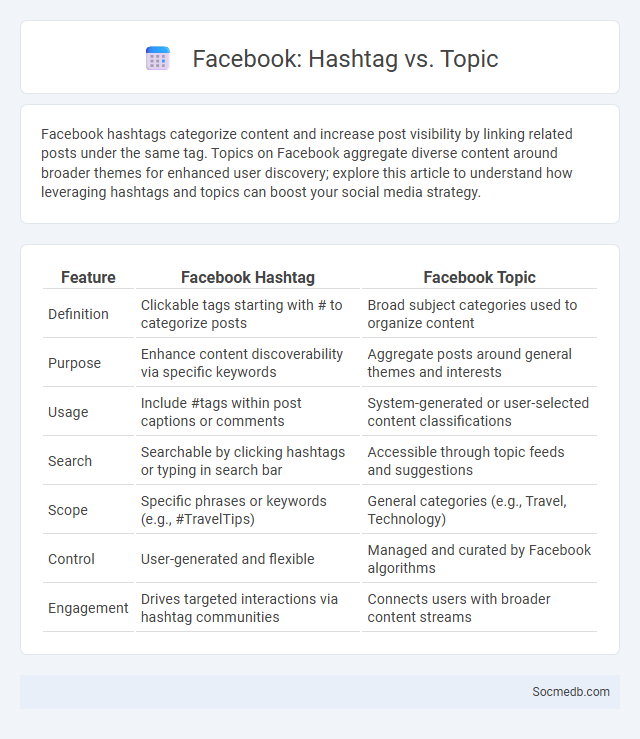
Photo illustration: Facebook Hashtag vs Topic
Facebook hashtags categorize content and increase post visibility by linking related posts under the same tag. Topics on Facebook aggregate diverse content around broader themes for enhanced user discovery; explore this article to understand how leveraging hashtags and topics can boost your social media strategy.
Table of Comparison
| Feature | Facebook Hashtag | Facebook Topic |
|---|---|---|
| Definition | Clickable tags starting with # to categorize posts | Broad subject categories used to organize content |
| Purpose | Enhance content discoverability via specific keywords | Aggregate posts around general themes and interests |
| Usage | Include #tags within post captions or comments | System-generated or user-selected content classifications |
| Search | Searchable by clicking hashtags or typing in search bar | Accessible through topic feeds and suggestions |
| Scope | Specific phrases or keywords (e.g., #TravelTips) | General categories (e.g., Travel, Technology) |
| Control | User-generated and flexible | Managed and curated by Facebook algorithms |
| Engagement | Drives targeted interactions via hashtag communities | Connects users with broader content streams |
Introduction: Understanding Facebook Engagement Tools
Facebook engagement tools help you increase interaction and build a stronger connection with your audience through features like reactions, comments, shares, and live videos. These tools provide valuable insights into user behavior, enabling you to tailor content that resonates with your followers effectively. Optimizing your use of Facebook's engagement options can significantly boost visibility and drive meaningful conversations on your posts.
What Are Facebook Hashtags?
Facebook hashtags are clickable words or phrases preceded by the "#" symbol that categorize content and make it easier to discover related posts. These hashtags help increase your content's visibility by linking your posts to broader conversations and trending topics on Facebook. Using relevant Facebook hashtags strategically can improve engagement and expand Your reach to targeted audiences.
What Are Facebook Topics?
Facebook Topics are specific categories or subjects that help organize and filter content across the platform, allowing users to discover posts, pages, and groups related to their interests. These topics enable your feed to display relevant updates by analyzing your interactions, helping you stay informed about areas like technology, sports, or entertainment. Leveraging Facebook Topics enhances your social media experience by connecting you with communities and content tailored to your preferences.
Key Differences Between Hashtags and Topics
Hashtags are user-generated keywords preceded by a "#" symbol, enabling content categorization and easy discovery across social media platforms. Topics, on the other hand, are broader subjects or themes curated by platforms to group related content, often enhancing trend analysis and personalized content delivery. Understanding these distinctions helps you optimize your social media strategy by targeting specific conversations with hashtags while exploring larger thematic trends through topics.
How Hashtags Work on Facebook
Hashtags on Facebook function as clickable links that categorize posts and make content discoverable by users searching for specific topics or trends. When you add a hashtag to your post, it joins a larger conversation, increasing its visibility beyond your immediate network. Using relevant and popular hashtags strategically enhances your post's reach and engagement on the platform.
How Topics Function on Facebook
Topics on Facebook function as thematic groupings that enable users to discover and engage with content related to specific interests or trending discussions. These Topics utilize algorithms to categorize posts, pages, and user interactions, enhancing content relevance and personalized user experiences. By following Topics, users receive curated updates, facilitating deeper community engagement and more efficient information retrieval on the platform.
When to Use Facebook Hashtags vs. Topics
Facebook hashtags are most effective when you want to increase the visibility of your posts within specific communities or trending conversations, allowing users to discover content by clicking on those hashtags. Topics on Facebook serve as broader categorical tags that organize content and help users find posts related to overarching themes or interests. Using hashtags strategically in your content helps you target niche audiences, while topics enhance content discoverability across larger user groups, optimizing Your social media engagement.
Best Practices for Facebook Hashtags
Effective Facebook hashtag strategies include using 1 to 3 relevant, targeted hashtags per post to increase visibility without overwhelming users. Incorporating niche-specific and trending hashtags helps connect with engaged audiences and improve post reach in Facebook's algorithm. Monitoring hashtag performance through Facebook Insights allows continuous optimization for better engagement and brand awareness.
Leveraging Facebook Topics for Greater Reach
Leveraging Facebook Topics enables marketers to target specific audiences based on detailed user interests and behaviors, enhancing content relevance and engagement. Utilizing Facebook's advanced topic categorization allows for precision in ad delivery, increasing visibility and conversion rates across diverse demographic segments. Continuous analysis of trending and niche topics on Facebook helps optimize campaigns, ensuring sustained reach growth and deeper community connection.
Choosing the Right Strategy: Facebook Hashtag or Topic?
Choosing the right social media strategy involves understanding the unique benefits of Facebook hashtags versus topics to maximize your content's reach and engagement. Facebook hashtags help categorize posts and make them discoverable to users interested in specific keywords, while topics aggregate conversations around broader themes and trends within the platform. Evaluating your target audience's behavior and the type of interaction you want to foster will guide your decision to optimize your social media presence effectively.
 socmedb.com
socmedb.com